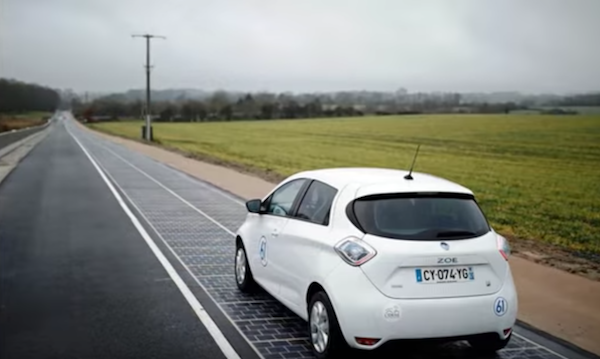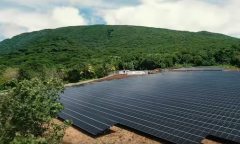By Vishal Goel, | December 23, 2016

The world's first solar road called Wattway in Normandy, France. (YouTube)
The world's first solar road made with 30,000 square feet (2,800 square metre) of solar panels has been opened in the French village of Normandy.
The one kilometre (0.6 mile) long road took five years and cost $5.2 million to develop. It will be used by around 2,000 motorists for a two-year test period to check if it can generate enough energy to power street lighting in the village of 3,400 residents.
Like Us on Facebook
The electricity-generating road was inaugurated on Thursday by the ecology minister of France, Ségolène Royal.
In 2014, a solar-powered cycle path was opened in Krommenie in the Netherlands, which generated 3,000 kWh of energy - enough to power an average family home for a year. However, the cost of building the cycle path was so high that it could have paid for 520,000 kWh.
Before opening the solar-powered road called Wattway, the panels were tested at four car parks across France. The construction, which was carried out by Colas (a part of the giant telecoms group Bouygues), was financed by the state.
Normandy is not known for receiving a good amount of sunshine. Caen, the region's political capital, gets strong sunshine for only 44 days a year as compared with 170 days in Marseilles. Royal said that she would like to install solar panels on one in every 1,000 km of French highway. France has a total of one million km of roads.
According to critics, it is not a cost-effective use of public money. The panels laid on flat surfaces have been found to be much less efficient than those installed on sloping areas like roofs.
Marc Jedliczka, the Vice President of Network for Energetic Transition told Le Monde: "It's, without doubt, a technical advance, but in order to develop renewables there are other priorities than a gadget of which we are more certain that it's very expensive than the fact it works."
The solar panels are covered by Colas with a resin containing fine sheets of silicon which make them tough enough to withstand all kind of traffic, including the HGVs. The company says it hopes to reduce the costs of producing the solar panels in future. Currently, Colas has about hundred other projects for solar-panelled roads - half in France and half abroad.
-
Use of Coronavirus Pandemic Drones Raises Privacy Concerns: Drones Spread Fear, Local Officials Say

-
Coronavirus Hampers The Delivery Of Lockheed Martin F-35 Stealth Fighters For 2020

-
Instagram Speeds Up Plans to Add Account Memorialization Feature Due to COVID-19 Deaths

-
NASA: Perseverance Plans to Bring 'Mars Rock' to Earth in 2031

-
600 Dead And 3,000 In The Hospital as Iranians Believed Drinking High-Concentrations of Alcohol Can Cure The Coronavirus

-
600 Dead And 3,000 In The Hospital as Iranians Believed Drinking High-Concentrations of Alcohol Can Cure The Coronavirus

-
COVID-19: Doctors, Nurses Use Virtual Reality to Learn New Skills in Treating Coronavirus Patients











